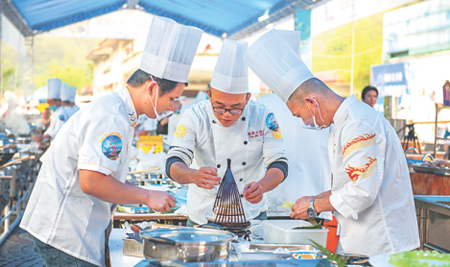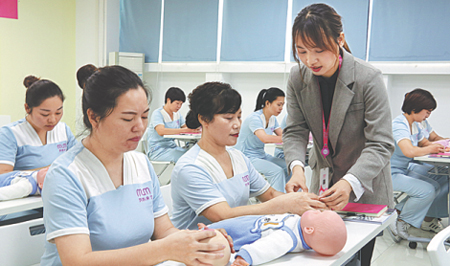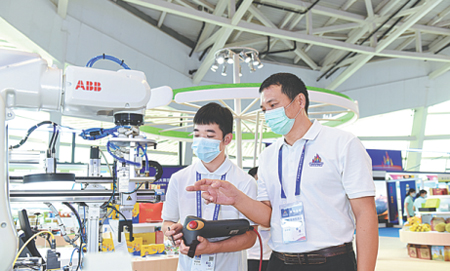Training the way to greater employment opportunities
Province makes remarkable achievements in programs promoting careers, better livelihoods and rural vitalization
The Guangdong government is marking the fifth year since the implementation of its training programs aimed at upping the skills of its less well-educated residents, announcing that they've helped almost 2.4 million people find work.
Since 2018, Guangdong has implemented training programs for Cantonese cuisine chefs, skilled workers and housekeepers as a way of meeting the local people's need for a better life, creating more jobs and supporting high-quality development.

Foreign friends show off Cantonese dim sum they have made under the guidance of local chefs. CHINA DAILY
To better promote the implementation of these programs, the provincial government set up special leadership teams at all levels in 2020, launching a series of opinion surveys and implementation plans for each program to form complete policy systems covering such aspects as personnel training and evaluation, industrial standard development and brand building.
Vocational colleges, companies and industrial associations have been encouraged to participate in the establishment of training alliances with these programs.
Over the past four years, the programs have trained a total of 7.68 million people. They have helped nearly 2.4 million people find jobs, or start their own businesses. They have achieved positive progress in stabilizing the employment rate, promoting rural vitalization and pursuing common prosperity, local officials said.

Cantonese cuisine chefs prepare dishes at a restaurant in Zhaoqing, Guangdong province. CHINA DAILY
Taking the Cantonese chef training as an example, the program strives to promote the industrialized development of Cantonese cuisine and snacks centering on rice noodles, Chaozhou beef and the Hakka-style noodles served with diced fried meat, chopped green onion and other ingredients.
Extra resources have been allocated for modern agricultural industrial parks to integrate green agriculture, e-commerce and logistics and to improve the supply chain of agro-products.
Guangdong has developed 32 rural tourism routes and 384 tourism spots featuring Cantonese cuisine, and it has named 109 well-known chefs and 100 famous Cantonese restaurants.

At a domestic service company in Guangdong province, employees receive training in infant care. CHINA DAILY
The provincial government has made efforts to list the cooking techniques of Chaozhou cuisine, a major branch of Cantonese cuisine, and the traditional production skills of rice noodles in the fifth batch of national intangible cultural heritage items.
It has also organized several cultural activities such as cooking skills competitions and high-end forums to enhance the influence of Cantonese cuisine both at home and abroad.
Chen Yiwei, head of the Human Resources and Social Security Department of Guangdong Province, said his team will further promote the three programs' regularized, standardized and professionalized development and their branding-up, in a bid to play their key role in maintaining and expanding employment.
During the 14th Five-Year Plan period (2021-25), Guangdong plans to train at least 200,000 people in its Cantonese chef program, and help 600,000 people find jobs and start businesses in the sector.

Bricklayers compete in the second Guangdong Provincial Vocational Skills Competition in 2021. ZHANG FENGFENG/FOR CHINA DAILY
The province will establish a number of national and provincial vocational colleges and technician schools as a way to balance the supply and demand of skilled personnel, and enhance their contribution to local economic growth.
Companies will be encouraged to offer more related job positions such as chief technicians and senior technicians to provide a broader vocational development space for skilled workers.
As for the training program for housekeepers, including postpartum nannies and babysitters, Guangdong plans to further improve credit and standards, and guarantee the systems of the housekeeping service industry.

As part of the competition, a vocational skills contest designed for electricians is held. ZHANG FENGFENG/FOR CHINA DAILY
It will support the construction of a number of demonstration bases, training centers, industrial parks and service stations for the industry, and name a group of leading housekeeping companies.
The province will call on all kinds of colleges and universities to offer housekeeping-related majors, compile related teaching materials, and train and introduce professional teachers in fields of maternal and infant care, as well as home-based, old-age and medical services.
One such beneficiary is Deng Xiaomei who now makes her living as a postpartum nanny, commonly known as yuesao in Chinese. She has gone from being in a position of poverty to earning more than 10,000 yuan ($1,585) a month.

A chef carves a watermelon at a Cantonese cuisine promotional event. CHINA DAILY
"I have a bigger goal now-that is to buy a new apartment in Heyuan city, my hometown," Deng said.
"I have applied the knowledge learned in the class to my work, and my clients think that I am professional and trust me," Deng said, adding that the training program has changed her life for the better.
Chen Min, Party chief of the Human Resources and Social Security Department of Guangdong Province, said at a news conference early this year that the department will continue its efforts to improve the efficiency of the three training programs, promote the shift in the focus of them from growing beneficiary population to improving training quality and establishing a reliable reputation for the programs.



 Print
Print Mail
Mail

